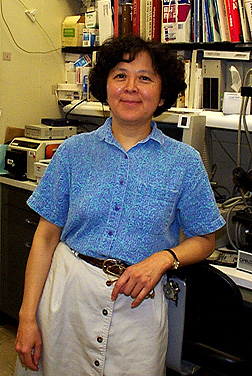
| T H E N I H C A T A L Y S T | J U L Y – A U G U S T 2000 |
|
|
|
FAES: NEW TERM, (RELATIVELY) NEW DEAN, NEW COURSES, AND A SEARCH FOR NEW TEACHERS AMONG NIH FELLOWS |
|
 |
|
Connie
Noguchi
|
The FAES (Foundation for Advanced Education in Science) Graduate School at NIH launches its fall semester the week of September 18. The deadline for mail-in registration is August 31. On-site registration will be held from September 6 through 12. (The fall catalogue is online at the FAES web site.)
Each year, about 3,000 individuals from NIH and the surrounding community participate in the school’s nearly 200 continuing education courses. The faculty is made up primarily of NIH permanent scientific staff, but FAES has a new dean who would like to expand the presence of NIH fellows at the school—not only as students but, more significantly, as teachers.
Constance Tom Noguchi, chief of the Molecular Cell Biology Section in the Laboratory of Chemical Biology, NIDDK, stepped in as FAES dean at the end of the Fall 1999 semester. Her predecessor, Paul Torrence, had worked with the NIH Fellows Committee (FELCOM; see story) to create an online database, accessible via the FAES web site, of postdoctoral fellows qualified to teach specific topics in biomedical research, a resource that FAES faculty and others could plumb for guest lecturers.
The next step, Noguchi says, is for more fellows to organize their own courses—an activity she helped foment by issuing a general call to NIH Interest Groups (see Directory) for new courses. Among those taking up the challenge is Carol Torgan, a senior staff fellow in NHLBI, who, together with Christine Winters of NINDS, is offering a new course (Biology 431) that explores recent advances and controversies in skeletal and cardiac muscle.
Subject areas missing from the FAES curriculum or expandable, in Noguchi’s view, include such timely topics as genomics and bioinformatics, as well as more classical subjects such as developmental biology. At the moment, there are only two course offerings in bioinformatics, which—based on the overflow that greeted the new Introduction to Bioinformatics course offered last spring—may not be nearly enough.
A perusal of the new 2000-2001
catalog shows 17 new science and medicine courses, including topics in neurophysiology
and development, stem cells, clinical carcinogenesis, women’s health, biomedical
ethics, impacts of biotechnology, and clinical preventive medicine. And as testimony
to the eclectic nature of the FAES learning environment, there are also new
courses in such subjects as French and darkroom techniques. For more information
about the FAES graduate school and the fall session, call Audrey
Lyons at 301-496-7976.
![]()
.
|
Women's Health Research Comes of FAES Age One of the FAES newcomers is called "Women’s Health: A Clinical Research Update"—a course, say its coordinators, whose time has come as surely as the rush to close the chasms in women’s health research that surfaced a decade ago. Emerging on the 10th anniversary this fall of the NIH Office of Research on Women’s Health (to be celebrated September 10 and 11), the course will cover such areas as immunity and autoimmune diseases, endocrinology, cardiovascular health, bone and musculoskeletal disorders, cancer, digestive disorders, infectious diseases, behavioral and social sciences, neuroscience, and reproductive health. These issues will be addressed in the context of developmental stages—from infancy and childhood through adolescence, reproductive and middle years, and old age. Due consideration will be paid to the effects of racial, ethnic, and cultural diversity. Meant to foster communication among biomedical and behavioral scientists in fields related to women’s health, the course is coordinated by Carmen Pastor, adjunct scientist, and Lawrence Nelson, senior clinical investigator, Gynecologic Endocrinology Unit, Section on Women’s Health Research, NICHD, with input from a planning committee headed by Vivian Pinn, NIH associate director for research on women’s health. "Women’s
Health: A Clinical Research Update," will be held Thursday evenings,
starting September 21, from 5:30 to 7:30 p.m. and will extend over the
fall and spring semesters, for two credits each. It will be offered in
alternate years. Prerequisites are graduate level training or experience
in the biomedical or health sciences or consent of the coordinators. For
more information, contact Carmen
Pastor or Larry
Nelson. |
| Ye
Olde Bookshoppe
For about 25 years of the more than 40 years FAES has existed, the FAES bookstore has been the place on campus to buy the books required for the courses. But the bookstore goes beyond the required FAES texts, offering a comprehensive array of biomedical and other scientific books, including books related to the teleconferencing classes sponsored by the Office of Education and off-campus universities. Some materials are available in CD form. And some titles have little to do with scientific courses—like travel guides, cookbooks, some best sellers, and children’s books. Browsing, says store manager Jerryann Gilbert, is welcomed. The bookstore special orders titles, reserves books, and handles shipments within the United States. Government credit cards and institute purchase orders can be used, and FAES members get a 5 percent discount on all purchases. The bookstore is
located on the B1 level of building 10, room L101, opposite the cafeteria
and bank and adjacent to and a bit behind the gift shop. It’s open
Monday through Friday, 8:30 am to 4:00 pm. |